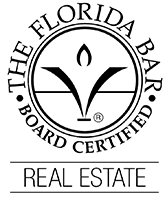Does the Florida Real Estate Buyer Need a Lawyer?
When buying real estate in Florida, the buyer needs a lawyer. Why? Because real estate is complicated. There are many pitfalls. And there is usually no one else to watch out for the buyer’s legal interest. Brokers and closing agents usually aren’t lawyers. They are usually transaction agents who don’t represent either side. Only lawyers represent one side or the other. That’s because ethical conflict rules prohibit lawyers from representing both sides of a real estate sale. So, Florida real estate buyers need lawyers to provide legal advice and represent their side of the deal.
The lawyer can help the buyer prepare and negotiate a purchase contract, then advise the buyer through the buyer’s due diligence inspection period, and then read the deed, title insurance commitment, and other closing documents on behalf of the buyer.
Specifically, the real estate buyer’s lawyer can do the following:
Due Diligence Period. The buyer’s lawyer can assist in preparing and negotiating a contract for purchase of the real property that includes a due diligence inspection period with broad wording to allow the buyer to check for obvious (patent) and non-obvious (latent) defects. These might be in the building, land, air or water. They could be environmental, structural, mechanical, electrical, or otherwise. The buyer might remember the Latin saying, Caveat Emptor, which means “Let the buyer beware.” This meant that the seller was not obligated to tell the buyer about defects known by the seller. While this ancient rule of law has changed with regard to residential real estate, it still applies in Florida to commercial real estate, so it is even more important for commercial real property buyers to do their due diligence inspections. However, it is still important for residential buyers to inspect for defects because sellers are not obligated to tell about defects that sellers are not aware of so the buyer might discover something unknown to the seller. In addition, if the residential seller fails to disclose a known defect and is liable to the buyer for not doing so, the seller might not have enough money left to pay the buyer damages for the nondisclosure. If the buyer does not discover the defect until after the closing, then it is too late to back out of the transaction without expensive litigation.
Clear Contract. The buyer’s lawyer can assist in drafting a clear contract that gives the buyer what the buyer expects to buy in the transaction. Sometimes this is done with a standard form such as the FR/Bar forms issued by the Florida Bar and Florida Realtors or the FAR forms issued by the Florida Realtors. The lawyer often prepares addenda to these standard forms to clarify aspects of the transaction on behalf of the buyer that might otherwise be unfavorable to the buyer. Sometimes, however, the lawyer prepares a form specifically for the particular transaction rather than using a standard form that has many provisions that are not applicable to the particular case. Unlike real estate brokers, lawyers are trained in the art and use of words and the drafting and interpretation of contracts.
Deadline Follow-up. All contracts for the purchase of real property should include deadlines for such matters as inspections, financing, title insurance, surveys, closing, etc. To avoid breaching the contract, it is important to comply with these deadlines. The lawyer can assist the buyer in scheduling contract deadlines.
Read Closing Documents and Include Protections. Legal documents can be written to include representations and warranties that are binding upon sellers after the closing in a way that may obligate them to pay damages to the buyer even years after the closing, but sellers try to avoid this wording so that any discovered defects are the buyer’s sole problems. If the buyer does not have an attorney the buyer may not have the benefit of including this wording in the contract, deed and other documents. Since the seller’s only goals are to get paid (and stay paid) and avoid litigation, it is important to include seller’s representations and warranties in contracts and deeds. Lawyers know which warranties and representations are standard and which are not, which can be negotiated in and which are more difficult to include.
Cost-Benefit of Legal Advice. The benefits of having a lawyer come at a cost: legal fees. Buyers who do not have lawyers do not pay legal fees; at least, not unless or until a breach or defect is discovered. Legal fees in litigation are expensive because it is fueled by opposing parties with opposing claims and positions. Legal fees paid to a buyer’s lawyer to advise the buyer before signing a contract to purchase and before closing on the contract are much less than legal fees in litigation. There is no crystal ball to determine in advance whether a particular deal will result in litigation so it is best to hire a lawyer to assist in assessing and minimizing the risks of the purchase transaction to the extent possible.
Therefore, the buyer of Florida real estate, whether it is residential or commercial, should always engage a Florida lawyer to assist in the transaction. Otherwise, there is really no one on the buyer’s legal side.
For additional information, see the free ebook written by Florida Bar Board Certified Real Estate Lawyer James W. Martin on Florida Real Estate Sales Contracts.






